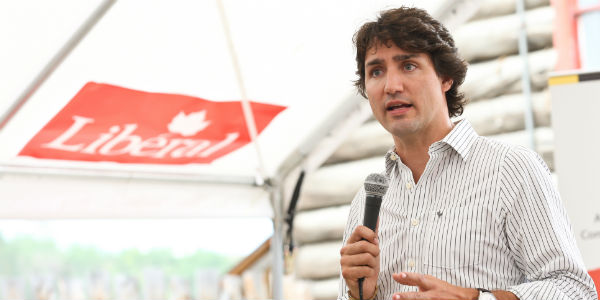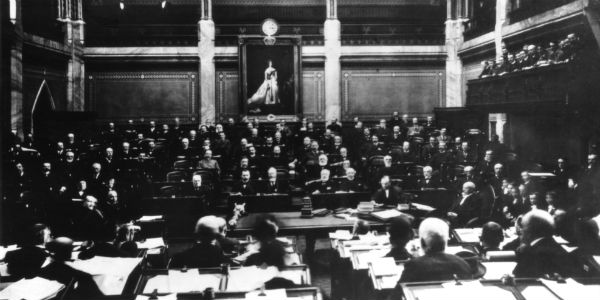Take note, Justin Trudeau: three reasons why changing an electoral system is so hard
Canada is thinking about changing its electoral system, write Kristof Jacobs and Lidia Núñez. Prime Minister Justin Trudeau has pledged that 2015 would be the last time Canadians elect a federal government using the first-past-the-post system. A parliamentary committee has been set up and talks are on the way. If Canada were to succeed, it would only be the second established democracy to change away from the first-past-the-post system – after New Zealand. It might also boost the case for reform in the UK. Electoral reform is often on the political agenda, yet actual changes are very rare. Why are electoral systems so hard to change? And how likely is Canadian electoral reform?

Justin Trudeau addresses the crowd at the Aboriginal People’s Commission reception in Yukon in 2013. Photo: Justin Trudeau via a CC-BY-NC-SA 2.0 licence
The barriers to electoral reform
In a new study, we show that on the rare occasions that electoral system change does occur, it is mainly under circumstances where the constitutional barriers are low, where the interests of the government parties are aligned and/or where courts force politicians to introduce changes to the system. Most studies try to explain why an electoral reform discussion is successful, we researched why it so often is not. In our study we included factors that were said to increase the likelihood of actual change (catalysts) as well as factors that were said to decrease this likelihood (barriers). Most importantly, the barriers turned out to outweigh the catalysts.
-
Constitutional rigidity
In most countries, crucial elements of the electoral system are enshrined in the constitution. Some constitutions are easy to change. In Italy and Greece, governments can quite easily change the constitution and it should not come as a surprise that both countries have witnessed a fair amount of electoral reforms. Other countries have rigid constitutions. The Netherlands and Belgium are just two examples of countries where changing the constitution is a painstaking affair. On average, the harder it is to change the constitution, the less likely is electoral reform. And in most countries, the constitution is hard to change.
-
The interests of the parties in government must align
Typically there is always something to win for bigger parties by changing the electoral system (e.g. changing the electoral boundaries or introducing an electoral threshold). But to garner enough support for an electoral system change, each of the reformers must agree on the general direction of that change.
Incumbent government parties typically have different incentives compared to non-incumbent government parties. The former are winning the game, the latter are losing a game that they were previously winning. Both may want electoral system change. When all the incumbents get re-elected, they may want to further consolidate their position and make future losses less likely. In the case of full alternation, all the government parties are non-incumbents. They are typically united in their quest to make sure that the electoral system no longer puts them at a disadvantage.
The likelihood of electoral reform is the lowest when both types of parties – incumbents and non-incumbents – are in the same government. In that sense, the Cameron I electoral reform agenda was doomed from the beginning. The Liberal Democrats clearly wanted to change the first-past-the-post system radically, but the compromise to hold a referendum on a merely slightly less majoritarian Alternative Vote system was too lukewarm a compromise to ignite anyone’s passion, let alone that of the electorate. Other examples are the Austrian Schüssel I government (2000-2002) and the Dutch Balkenende II government (2003-2005).
-
Lack of judicial review
The presence of a Constitutional Court (or a court with similar powers) also matters. A court can have a direct impact by demanding or triggering electoral reforms. It can also have an indirect impact by legitimising the position of parties who want to reform the system (and undermining arguments made by its opponents).
Italy and Germany are the main examples here. The Italian court has been crucial in allowing referendums in the 1990s (indirect impact) and scrapped the majority bonus of the then electoral system in 2013 (direct impact). Similarly, the German court played an indirect role in the 1990s by legitimising reforms of the German electoral threshold and demanding a solution to the German problem of surplus seats in 2008.
However, such an active Constitutional Court is relatively rare. Countries without such a court – such as the UK – are therefore less likely to see electoral system changes.
The likelihood of Canadian reform

The Canadian House of Commons in session, c1900. Photo: Parliament of Canada via a CC-BY 2.0 licence
Changing the Canadian electoral system might require a constitutional change, and in that case the provinces need to agree. This would make reform a lot more difficult. However, of the three aforementioned elements, the absence of aligned interests matters most to the Canadian case. Originally Trudeau’s Liberals wanted a parliamentary committee on electoral reform where they would hold the majority. They wanted to implement the Alternative Vote system. But after much societal and political outrage, the composition of the committee was changed to give smaller parties more clout, bringing together opposite interests ranging from the Greens’ commitment to proportional representation to the Conservatives’ reluctance to change anything. As a result, the outcome of the committee is far less certain to be a new system that benefits the Liberals.
The main matter the Committee is now discussing is whether a proposed electoral system change would need to be presented to the public in a referendum. Whereas in the beginning the Liberals did not deem a referendum necessary, their current position is that they “will abandon their plans to overhaul Canada’s electoral system if they don’t have widespread public support.” Given the abysmal track record of Canadian electoral reform referendums, that would be the kiss of death to the reform proposal. And a relatively clean way for the Liberals to abort an electoral reform agenda over which they lost control.

 Kristof Jacobs is a lecturer at Radboud University (Nijmegen, NL). He writes regularly about electoral system change, referendums and wrote a book on the impact of social media on politics. You can follow him on Twitter.
Kristof Jacobs is a lecturer at Radboud University (Nijmegen, NL). He writes regularly about electoral system change, referendums and wrote a book on the impact of social media on politics. You can follow him on Twitter.
Lidia Núñez is a consultant and honorary postdoctoral researcher (F.R.S.-FNRS) at the Université Libre de Bruxelles (Belgium).





 Democratic Audit's core funding is provided by the Joseph Rowntree Charitable Trust. Additional funding is provided by the London School of Economics.
Democratic Audit's core funding is provided by the Joseph Rowntree Charitable Trust. Additional funding is provided by the London School of Economics.
Our most popular piece this week | Take note, Justin Trudeau: 3 reasons why changing an electoral system is so hard https://t.co/s1ATJWOQv0
Take note, Justin Trudeau: three reasons why changing an electoral system is so hard https://t.co/AbAHFwrSfF
Take note, Justin Trudeau: three reasons why changing an electoral system is so hard https://t.co/Y6HeDwIfVW
Take note, Justin Trudeau: three reasons why changing an electoral system is so hard https://t.co/lo8NEYgHfq
Take note, Justin Trudeau: three reasons why changing an electoral system is so hard https://t.co/12Cd5KlWvw
Changing the Cdn electoral system might require a constitutional change, & in that case the provinces need to agree. https://t.co/066hrW9IH4
Take note, Justin Trudeau: three reasons why changing an electoral system is so hard https://t.co/yj9RVohWhz
Why are #electoral #systems so hard to change? Interesting thoughts by @KristofJacobs1 & L.Nunez https://t.co/InIVz0BPCf @democraticaudit
Take note, Justin Trudeau: three reasons why changing an electoral system is so hard https://t.co/lo8NEXZ5QQ
Take note, Justin Trudeau: three reasons why changing an #electoral system is so hard https://t.co/C3SsSYwppJ
this reform will liberal stay in power forever and never one party agenda work . more immigrant in canada and will become third world country.
Let’s start Electoral Reform by increasing voter turnout. Make it mandatory for everyone to vote.
Thoughts from the UK: three reasons why Trudeau might find changing the electoral system a hard thing to do https://t.co/rNO6WRLPCr #CanPoli
Why changing an electoral system is so hard – interesting & rigorous despite anti-preferential bias https://t.co/47uy9XuArS @KristofJacobs1
Take note Justin Trudeau, changing the electoral system is very hard.
Blog for @democraticaudit with Lidia Nunez
https://t.co/DbJDU7Q9Ed
Why Justin Trudeau’s efforts to abandon first-past-the-post could be doomed ( https://t.co/s1ATJWOQv0
Take note, Justin Trudeau: three reasons why changing an electoral system is so hard https://t.co/s1ATJX6rmy https://t.co/obqTxcQTvW